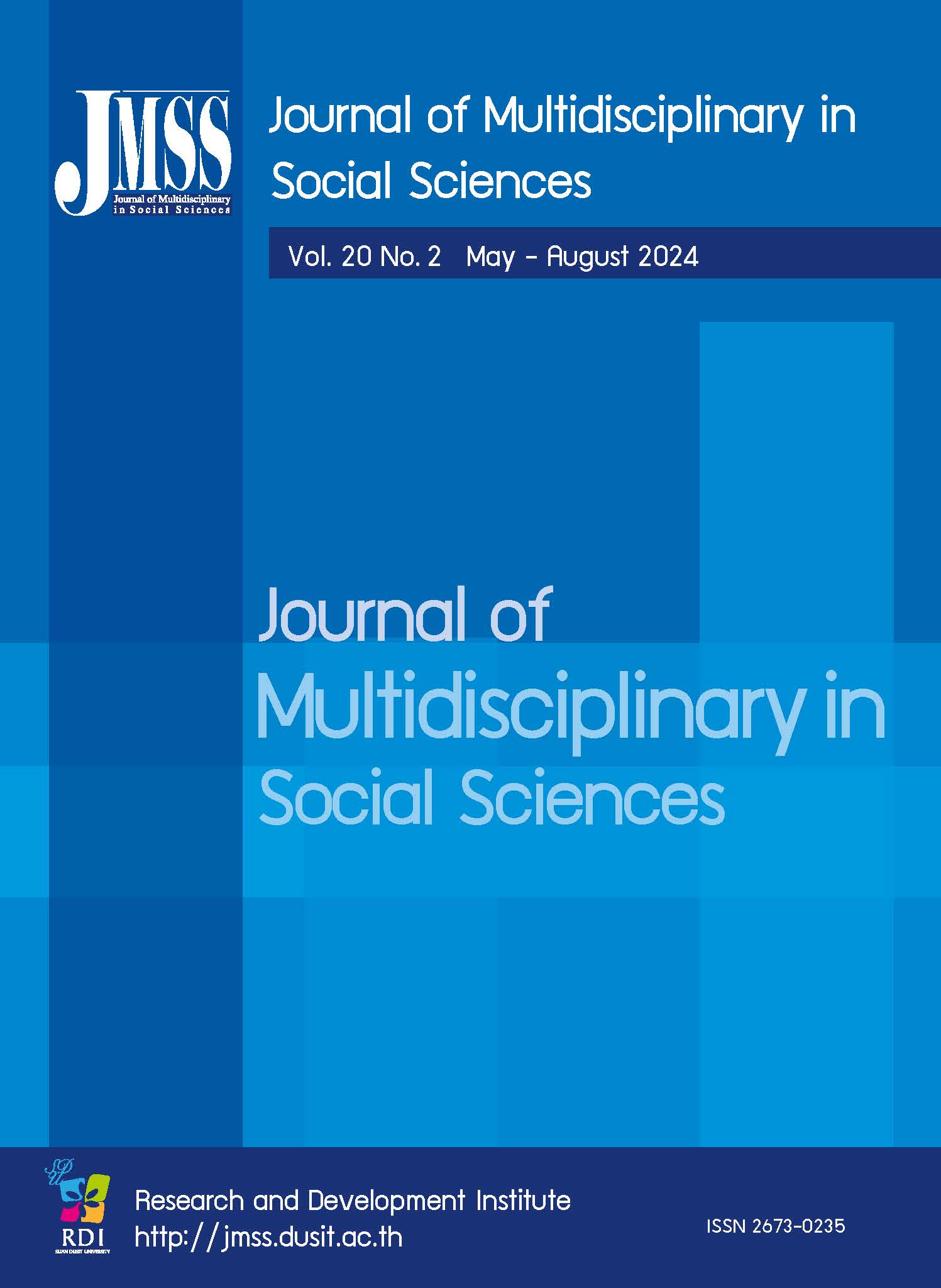Towards Sustainable Success: A Management Model for Thai Massage Enterprises
Keywords:
Business management, Management model, Sustainability, Thai massage businessAbstract
This research was conducted to 1) examine the current situation of Thai massage business management, 2) explore the supportive and obstructive factors affecting the sustainable management of Thai massage businesses, and 3) propose a management model that fosters sustainability in the Thai massage industry. Utilizing a mixed-methods approach, this study incorporates both qualitative and quantitative research methodologies. The qualitative research was conducted through in-depth interviews and focus group discussions involving primary informants—managers, employees, and service users from Thai medical centers and Thai massage businesses, along with academics, totaling 40 participants. The quantitative research, conducted via surveys, involved 400 administrators from Thai medical centers and 400 Thai massage service users. This study has developed a management model to enhance the sustainability of the Thai massage industry, which can be practically applied in the current environment. The findings indicate that current Thai massage business management must prioritize attentive customer service, sustainable management practices, and maintaining safety and hygiene standards. Internal support factors include a commitment to service, diversity of services offered, and long-standing knowledge accumulation within Thai medical centers. External support factors affecting Thai massage industry’s sustainability include the recognition of Thai massage standards, its reputation prompting domestic and international tourism, and governmental policies service standards. However, internal obstacles include a lack of business knowledge and experience among managers, leading to high operational costs, misaligned promotional activities, and insufficiently skilled personnel in massage techniques and foreign languages. The impact of COVID-19 has led to a workforce reduction as some employees have returned to their hometowns or changed professions. In addition, the results showed a lack of understanding about cleanliness management among establishments, causing distrust among service recipients. External obstacles include economic downturns, unsupportive governmental policies for service businesses, and complex and costly professional licensing processes. This research also proposes an appropriate management model to enhance sustainability in the Thai massage industry, requiring the integration of five standards: environment and facilities, personnel, services, products, tools and equipment, and organizational management.
References
Boulanger, K., & Campo, S. (2013). Are personal characteristics of massage therapists associated with their clinical, educational, and interpersonal behaviors? International Journal of Therapeutic Massage & Bodywork, 6(3), 25-34.
Brown, C. S. (2014). Language and literacy development in the early years: Foundational skills that support emergent readers. Language and Literacy Spectrum, 24, 35-49.
Chantaburee, S. (2016). Opportunity and Competitiveness of Spa and Thai Massage Business in Thailand. Kasem Bundit Journal, 17(2), 49-63.
Cottingham, P., Adams, J., Vempati, R., Dunn, J., & Sibbritt, D. (2018). The characteristics, experiences and perceptions of registered massage therapists in New Zealand: results from a national survey of practitioners. International Journal of Therapeutic Massage & Bodywork, 11(2), 11-24.
De la Mora Velasco, E., Huang, A., & Haney, A. (2021). An employee sharing model for the tourism and hospitality industry. Tourism and Hospitality, 2(2), 190-194.
Department of Disease Control. (2020). How does massage/spa work? Safe COVID-19. Retrieved January 28, 2020 from http://envocc.ddc.moph.go.th/contents/view/915.
Johnson, K. (2020). How the Salon and Spa Experience Will Change Once the Industry Reopens. Retrieved March 29, 2020 from https://www.allure.com/story/salon-experience-changing-covid-19.
Kongnanta, P. (2010). Factors influencing the selection of Thai massage among foreign tourists on Khao San Road. Bangkok (Master's thesis). Silpakorn University, Bangkok.
Lam, E., Shih, E., Chin, K., & Zen, K. (2021). The double-edged sword of health and safety: COVID-19 and the policing and exclusion of migrant Asian massage Workers in North America. Social Sciences, 10(5), 157.
Lamb, S., Kwok, K. C., & Walton, D. (2014). A longitudinal field study of the effects of wind-induced building motion on occupant wellbeing and work performance. Journal of wind engineering and industrial aerodynamics, 133, 39-51.
Poachree, L. (2017). The Customer’s Satisfaction in Thai Massage Service Quality in Muang Mahasarakham, Mahasarakham Proviance. Humanities and Social Sciences Journal, Ubon Ratchathani Rajabhat University. 8(1), 131-141.
Robbins, S. P., & Coulter, M. (2007). Principles of management (4th ed.). Translated by Seyyed Mohammad Arabi and Mohammed Ali Hamid Rafiee and Behrouz Asrari Ershad. Tehran: Office of Cultural Studies.
Thai Spa Association. (2020, January 13). International Wellness Tourism Growing Much Faster Than Domestic. Retrieved from http://www.thaispaassociation.com/news_inside.php?news_id=22.
Wimonchaileuk, T., Sansom, K., & Chotechoei, N. (2019). Causal relationship model of factors affecting service quality to create a competitive advantage of Thai massage business in Thailand. Journal of Humanities and Social Sciences, Surindra Rajabhat University, 21(2), 45-62.
Downloads
Published
How to Cite
Issue
Section
License
Copyright (c) 2024 Journal of Multidisciplinary in Social Sciences

This work is licensed under a Creative Commons Attribution-NonCommercial-NoDerivatives 4.0 International License.








